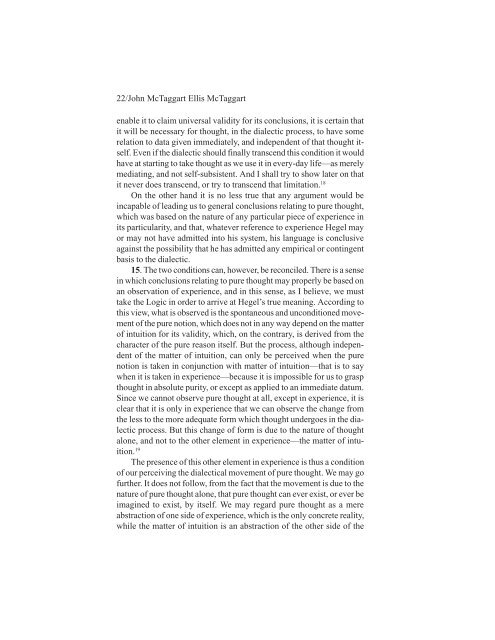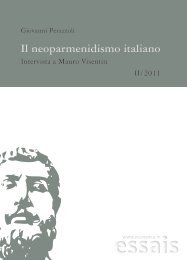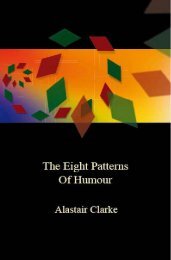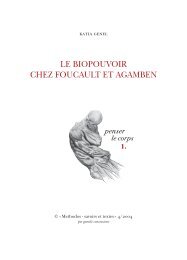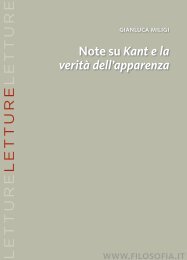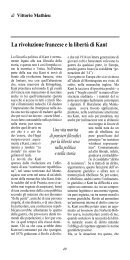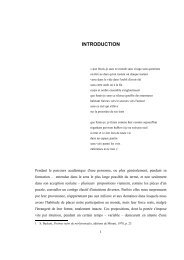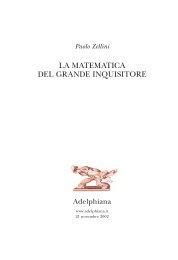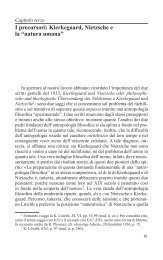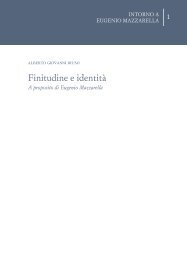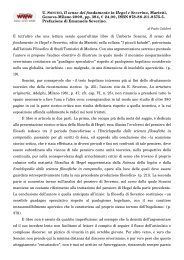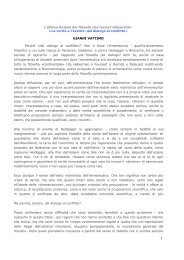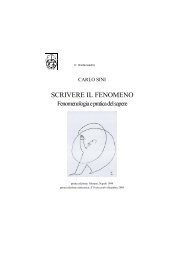McTaggart, Studies in the Hegelian Dialectic
McTaggart, Studies in the Hegelian Dialectic
McTaggart, Studies in the Hegelian Dialectic
You also want an ePaper? Increase the reach of your titles
YUMPU automatically turns print PDFs into web optimized ePapers that Google loves.
22/John <strong>McTaggart</strong> Ellis <strong>McTaggart</strong><br />
enable it to claim universal validity for its conclusions, it is certa<strong>in</strong> that<br />
it will be necessary for thought, <strong>in</strong> <strong>the</strong> dialectic process, to have some<br />
relation to data given immediately, and <strong>in</strong>dependent of that thought itself.<br />
Even if <strong>the</strong> dialectic should f<strong>in</strong>ally transcend this condition it would<br />
have at start<strong>in</strong>g to take thought as we use it <strong>in</strong> every-day life—as merely<br />
mediat<strong>in</strong>g, and not self-subsistent. And I shall try to show later on that<br />
it never does transcend, or try to transcend that limitation. 18<br />
On <strong>the</strong> o<strong>the</strong>r hand it is no less true that any argument would be<br />
<strong>in</strong>capable of lead<strong>in</strong>g us to general conclusions relat<strong>in</strong>g to pure thought,<br />
which was based on <strong>the</strong> nature of any particular piece of experience <strong>in</strong><br />
its particularity, and that, whatever reference to experience Hegel may<br />
or may not have admitted <strong>in</strong>to his system, his language is conclusive<br />
aga<strong>in</strong>st <strong>the</strong> possibility that he has admitted any empirical or cont<strong>in</strong>gent<br />
basis to <strong>the</strong> dialectic.<br />
15. The two conditions can, however, be reconciled. There is a sense<br />
<strong>in</strong> which conclusions relat<strong>in</strong>g to pure thought may properly be based on<br />
an observation of experience, and <strong>in</strong> this sense, as I believe, we must<br />
take <strong>the</strong> Logic <strong>in</strong> order to arrive at Hegel’s true mean<strong>in</strong>g. Accord<strong>in</strong>g to<br />
this view, what is observed is <strong>the</strong> spontaneous and unconditioned movement<br />
of <strong>the</strong> pure notion, which does not <strong>in</strong> any way depend on <strong>the</strong> matter<br />
of <strong>in</strong>tuition for its validity, which, on <strong>the</strong> contrary, is derived from <strong>the</strong><br />
character of <strong>the</strong> pure reason itself. But <strong>the</strong> process, although <strong>in</strong>dependent<br />
of <strong>the</strong> matter of <strong>in</strong>tuition, can only be perceived when <strong>the</strong> pure<br />
notion is taken <strong>in</strong> conjunction with matter of <strong>in</strong>tuition—that is to say<br />
when it is taken <strong>in</strong> experience—because it is impossible for us to grasp<br />
thought <strong>in</strong> absolute purity, or except as applied to an immediate datum.<br />
S<strong>in</strong>ce we cannot observe pure thought at all, except <strong>in</strong> experience, it is<br />
clear that it is only <strong>in</strong> experience that we can observe <strong>the</strong> change from<br />
<strong>the</strong> less to <strong>the</strong> more adequate form which thought undergoes <strong>in</strong> <strong>the</strong> dialectic<br />
process. But this change of form is due to <strong>the</strong> nature of thought<br />
alone, and not to <strong>the</strong> o<strong>the</strong>r element <strong>in</strong> experience—<strong>the</strong> matter of <strong>in</strong>tuition.<br />
19<br />
The presence of this o<strong>the</strong>r element <strong>in</strong> experience is thus a condition<br />
of our perceiv<strong>in</strong>g <strong>the</strong> dialectical movement of pure thought. We may go<br />
fur<strong>the</strong>r. It does not follow, from <strong>the</strong> fact that <strong>the</strong> movement is due to <strong>the</strong><br />
nature of pure thought alone, that pure thought can ever exist, or ever be<br />
imag<strong>in</strong>ed to exist, by itself. We may regard pure thought as a mere<br />
abstraction of one side of experience, which is <strong>the</strong> only concrete reality,<br />
while <strong>the</strong> matter of <strong>in</strong>tuition is an abstraction of <strong>the</strong> o<strong>the</strong>r side of <strong>the</strong>


